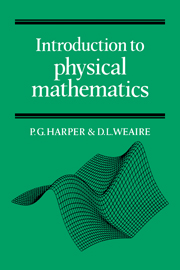Book contents
- Frontmatter
- Contents
- Preface
- Some notes on notation
- 1 Introduction
- 2 Errors
- 3 Cartesian coordinates
- 4 Vectors
- 5 The scalar product
- 6 The vector product and rotation
- 7 Matrices in physics
- 8 The transformation of matrices
- 9 The matrix eigenvalue equation
- 10 Exponential and logarithm functions
- 11 Sine and cosine functions
- 12 Graph plotting and curve sketching
- 13 Differentiation
- 14 Approximations
- 15 Power series and Taylor's expansion
- 16 Partial differentiation
- 17 Integration
- 18 The differential equation
- 19 Solving first-order differential equations
- 20 Second-order differential equations
- 21 Solving second-order differential equations
- 22 The complex exponential
- 23 The circuit equation
- 24 Harmonics and Fourier series
- 25 The diffusion equation
- 26 Waves
- 27 The rate of change of a vector
- 28 The scalar field and gradient operator
- 29 The vector field
- 30 Line integration
- 31 The potential field
- 32 Surface and volume integration
- 33 Flux and divergence
- 34 Circulation and the curl
- 35 Conclusion
- 36 Miscellaneous exercises
- Index
1 - Introduction
Published online by Cambridge University Press: 20 October 2009
- Frontmatter
- Contents
- Preface
- Some notes on notation
- 1 Introduction
- 2 Errors
- 3 Cartesian coordinates
- 4 Vectors
- 5 The scalar product
- 6 The vector product and rotation
- 7 Matrices in physics
- 8 The transformation of matrices
- 9 The matrix eigenvalue equation
- 10 Exponential and logarithm functions
- 11 Sine and cosine functions
- 12 Graph plotting and curve sketching
- 13 Differentiation
- 14 Approximations
- 15 Power series and Taylor's expansion
- 16 Partial differentiation
- 17 Integration
- 18 The differential equation
- 19 Solving first-order differential equations
- 20 Second-order differential equations
- 21 Solving second-order differential equations
- 22 The complex exponential
- 23 The circuit equation
- 24 Harmonics and Fourier series
- 25 The diffusion equation
- 26 Waves
- 27 The rate of change of a vector
- 28 The scalar field and gradient operator
- 29 The vector field
- 30 Line integration
- 31 The potential field
- 32 Surface and volume integration
- 33 Flux and divergence
- 34 Circulation and the curl
- 35 Conclusion
- 36 Miscellaneous exercises
- Index
Summary
Most physical laws express numerical relations between quantities which can be independently measured, such as the mass of a body, its acceleration and the force which is applied to it. Ultimately, they are established or refuted by experiment. The range of their validity is determined by the range of practicable experiments. Their generality is always in question, and physicists continually seek new insights in the breakdown of old theories.
It is important therefore to distinguish between physical laws, which are provisional and approximate (since, in principle, we expect to find circumstances in which they do not apply), and other mathematical relationships which are merely conventional definitions, such as ‘momentum equals mass times velocity’. These cannot be overturned, although there may be a time or a place in which they are not useful.
Given a problem to solve, we make the transition to mathematics by choosing appropriate physical laws and definitions. For the purposes of mathematical manipulation we may provisionally regard this formulation as exact, but in practice we will soon encounter uncertainties of two kinds.
First, if we wish to use experimentally measured quantities as numerical input to our calculations, as must ultimately be the case, we should recognise that every measurement involves some degree of uncertainty. The word ‘error’ is commonly used for this, which is unfortunate, because it need not be the result of any mistake or misjudgement, but may simply follow from the limited accuracy of the available measuring apparatus.
Information
- Type
- Chapter
- Information
- Introduction to Physical Mathematics , pp. 1 - 4Publisher: Cambridge University PressPrint publication year: 1985
